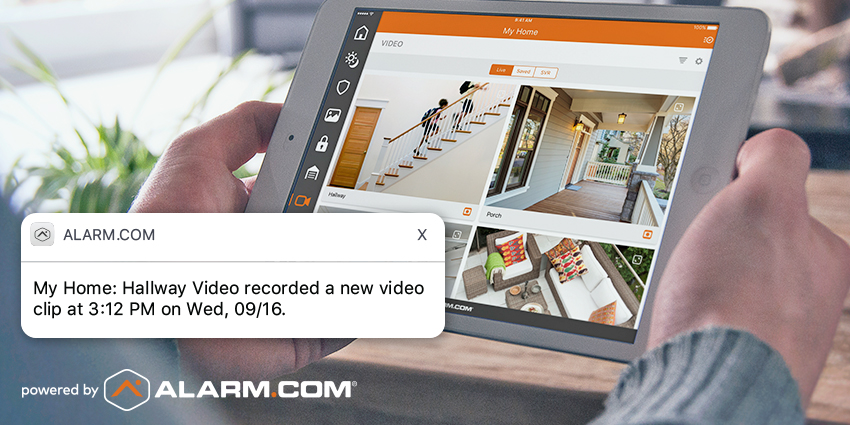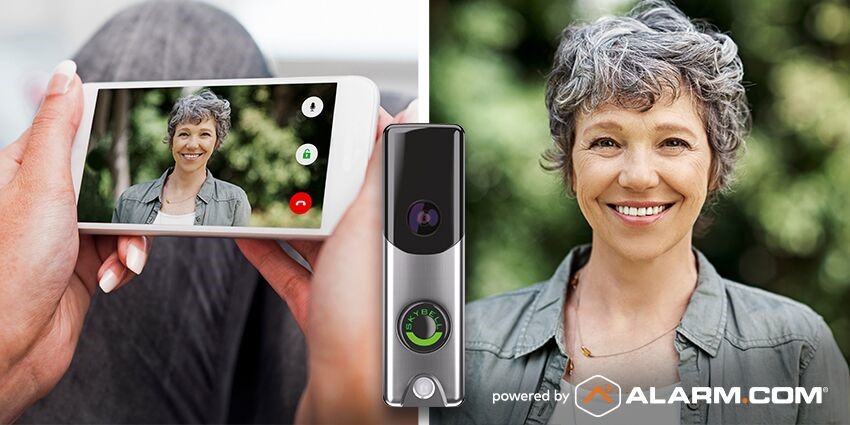Anyone who reads our blog regularly knows that we highly recommend installing security cameras. Regardless of the application, cameras create valuable security for any residential or commercial property. Additionally, installing surveillance adds to any property’s value as well. However, we often install quite different types of cameras for different purposes in homes than we do in businesses. In this post, we aim to help anyone comparing home and business cameras by explaining the differences in installation, equipment, and camera and usage of both.
To start, we’ll explain why so many of our customers install cameras to begin with. Understanding the main security benefits of video surveillance provides a great foundation for the rest of the post. From there, we’ll set about comparing home and business cameras in earnest. This will include explaining how the installation of home cameras often differs from installing commercial surveillance. Next, we’ll see the differences between what home and business owners look for when designing their camera systems. Then, we’ll share how home and business cameras allow you to record and view video. Finally, we’ll list some of the more unique camera options available to both home and business customers. Now, let’s dive in with a look at the benefits of installing cameras.
The Benefits of Installing Cameras
Generally speaking, most of our customers understand the “basics” of surveillance camera functionality. For example, most people know that cameras record video for future reference. However, we surprise many people by showing them how they can watch their cameras live either remotely or on-site. In fact, we can create a connection between any camera system and a property’s network. This allows users to view their cameras’ live and stored footage with any network-connected device at any time!

Installing cameras allows you to receive instant alerts if someone enters your property, such as this Alarm.com smart camera alert.
Furthermore, we can also create live push alerts to notify customers about motion on their property. This helps keep you “in the know” about activity, even during an extended absence. Finally, the presence of surveillance alone can deter crime. After all, thieves seeing a visible security presense will often commit their crimes elsewhere. Therefore, adding this security creates the ability to both deter and solve crime or suspicious activity. Of course, both residential and commercial cameras come with these valuable security features. Now, let’s look into the differences between the two.
Comparing Home and Business Cameras
When we install cameras in a house versus a business, many potential differences arise. Of course, plenty of similarities also exist. In fact, we occasionally install “commercial” style cameras in homes. Conversely, some small businesses may also only require residential-grade surveillance. However, we generally find certain major differences in equipment, installation styles, desired reasons for adding security, and video recording and viewing methods. In this section, we’ll break these differences down for you. Let’s get started by seeing how we install our diferent types of cameras.
Installation Methods
We have a couple main methods of installing cameras. Traditionally, installing cameras involves running wiring from a centralized recorder to each camera location. We’ll share more detail about this recorder in a bit. For now, the most important point is that for most business applications, we still utilize completely hardwired cameras. This type of setup allows for a consistent and reliable surveillance experience. Since each camera sends video back to the recorder through a dedicated wire, the video quality stays quite high at all times. When video quality and reliability are of the essence, commercial-style, hardwired cameras are the way to go.
When we install cameras in homes, we often change our installation approach. Homeowners frequently opt for wireless smart cameras for their security needs. Part of this lies in the different reasons homeowners install these cameras. We’ll certainly expound on this in the next section. Smart cameras do not require a hardwired connection to a recorder. Instead, they use a property’s wifi signal to transmit video. This allows for a quicker and less expensive installation than hardwired cameras provide. It also allows us to install cameras in areas of a home where we could not run wiring. This simpler, more cost-effective solution often fits homeowners’ security needs well. Now, let’s look at the different types of motivation our residential and commercial customers have when installing cameras in the first place!
Why Do Business and Home Owners Install Cameras?
When we work with customers to design surveillance systems, we always ask what they want to “catch” with their cameras. In general, we often find that business owners require more detail and video quality than homeowners. For example, commercial cameras must often cover large areas with great detail. This can help identify people and vehicles that enter a property. Furthermore, these applications often require the reliability and performance of high-quality, hardwired cameras.
On the other hand, homeowners often simply want to monitor activity around the home. For example, homeowners may want to receive a video alert with footage of children walking in from school. Or perhaps they want cameras to check in on their pets in the yard. While important, these types of concerns often get addressed with simple, lower-quality cameras than those we would install in a business. Of course, this also means that residential camera customers often pay much less than their commercial counterparts. With these differences in security goals and expectations in mind, let’s see how home and commercial cameras differ in their recording and viewing methods.
Video Recording and Viewing
When it comes to storing and viewing footage, home and business cameras often operate quite differently. For starters, residential smart cameras generally record only upon detecting motion. At that point, the video footage often gets stored in the cloud for a short period of time. This allows customers to view stored footage for at least a week, and sometimes up to a month, after an event. Additionally, some smart cameras, such as our preffered Alarm.com model, can also connect to a wifi-based recorder to store more footage. However, this wifi connection does not create as consistent recording as a hardwired recorder. When the wifi connection falters, the recorder does not record until the signal strength improves.

Installing a video doorbell allows you to view and communicate with visitors to your home.
As we touched on above, commercial camera systems generally utilize a hardwired recorder to store video. These recorders capture footage 24/7, even in times of inactivity. We can also add storage space to these recorders in order to add capacity for additional footage. In fact, many businesses have a minimum amount of storage they must have captured at all times. For example, the Cannabis Control Commission (or “CCC”) in Massachusetts requires cannabis retailers to have 90 days’ worth of video stored at all times. Next up, let’s continue comparing home and business cameras with an eye on the more unique offerings for either type of camera.
Unique Video Camera Options
Both home and businesses-focused cameras allow users to install some unique and effective products. For example, in addition to smart cameras, homeowners often install smart video doorbells. Just as with our standard smart cameras, we recommend Alarm.com-powered video doorbells. Residents of a home can view these cameras on their phone any time they desire. Additionally, visitors can initiate a video call by activating the doorbell. This allows you to see and communicate with anyone at your door. Just as with standard smart cameras, you can also create motion-based alerts for these doorbells. This helps secure your home against package theft, as it alerts you when someone approaches your door whether they ring the doorbell or not. At that point, you can speak through the doorbell and warn your uninvited guests that they are on camera and that you’re watching.
Commercial cameras also offer a few interesting options to help add security to your property. For starters, we can order cameras with enhanced features for specific situations. For example, cameras with enhanced zooming capabilities can help secure areas hundreds of feet away from the location of the camera itself. Some cameras also have powerful night-vision technology to help them capture useful video in the dark. Additionally, you can also purchase commercial cameras with different types of viewing capabilities. Cameras with 180-degree and even 360-degree lenses allow you to cover large areas with fewer cameras. These options help us create an efficient surveillance system design for any business application.
Putting it All Together
We hope that this post comparing home and business cameras helps you better understand your surveillance options. Additionally, we encourage you to contact us with any questions you may have about the material presented in this post. We will gladly help you understand how to add this important security to your home or business. Moreover, we invite you to take advantage of our free site survey program. We provide complimentary security audits and equipment quotes to both new and existing customers alike.
Perhaps you have some security in place and want to add surveillance as an additional measure. Or, maybe you have very little security now and wish to add both cameras and additional security equipment. Either way, we are here to help. We’ve assisted hundreds of residential and commercial customers create complete security plans. Together, we can help make your property, your most valued possessions or business equipment, and everyone on your property as safe and secure as possible!
